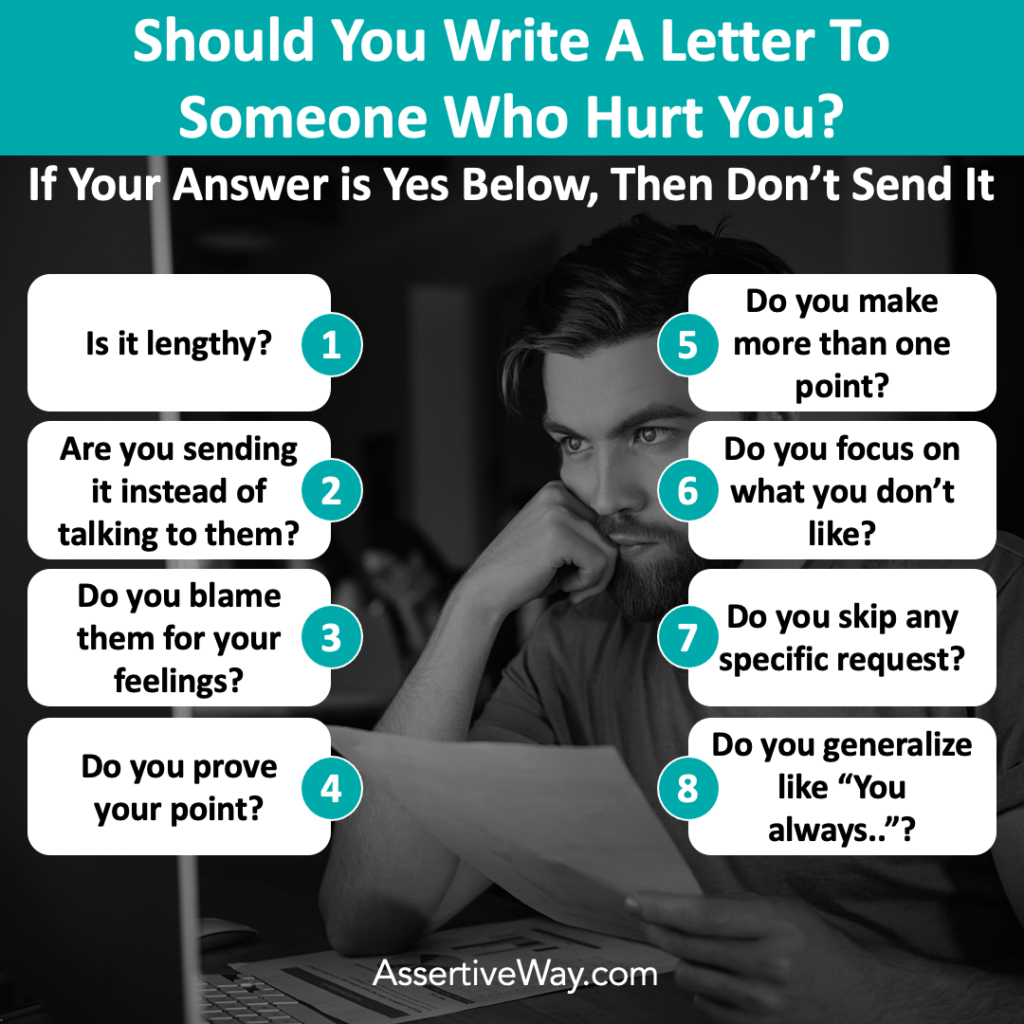If you are upset with someone, write a letter to them but don’t send it, especially if you answer yes to any of the questions below. When you are calm, have an assertive conversation with them.
By Assertive Way
Key Takeaways
- Angry emails and letters are intended to vent of frustration not to resolve problems, therefore don't send them.
- Check if your message is an angry message by answering the 8 questions below.
- Once you are calm, speak to the person directly and be assertive.
Sign up for our Weekly Newsletter “Nice With Limits” for tips and inspiration for confidence at work and to boost your career!
We take your email seriously and will never sell or share it.
If you are upset with someone, write a letter to them but don’t send it, especially if you answer yes to any of the questions below. When you are calm, have an assertive conversation with them.
Have you ever written an email or letter to someone who you were frustrated with?
It’s tempting to send a scathing message to someone to prove them wrong or to express how miserable they made your life, because it feels really good to express yourself.
However, when the main goal of a letter or email is to vent off frustration and to prove yourself right to the other person, then that is an angry letter or email.
Angry messages are not assertive. They don’t address problems, they don’t improve the relationships, they don’t change other people’s behaviors, and they won’t make you feel better. They also cause more friction and don’t get others to empathize with your situation.
A Chinese proverb says “Never write a letter while you are angry” especially if you don’t want to have regrets later.
Angry letters are great if written and left unsent. They help you better cope with frustration, name your negative emotions, and release them.
Here are 8 questions to help you identify if you wrote an angry letter that will make the problem worse.
Is it very lengthy with big paragraphs?
Long letters or emails that are more than a few paragraphs long are too long. People don’t like to read long messages. Even if they read them, they can’t remember much and they certainly won’t engage with it. Therefore lengthy letters are for you, not them.
Do you plan to send it instead of having a live conversation?
It’s feels safer to have a hard conversation over an email or letter, but it is a false sense of safety. It is uncomfortable to confront the person we are frustrated with in a direct way.
They are unidirectional. You won’t read their non-verbal language. You won’t get any truthful feedback. You won’t be able to adjust your message to their response. You won’t be able to use your most powerful tools which are your voice, eye contact, facial expressions and body language to deliver your message in a powerful and effective way.
And worse of all, you many never hear about it from them. It is a monologue act that is best kept for yourself.
Do you make someone else responsible for your frustration?
Look for phrases that start with “you” followed by a negative accusation. Does your message assume negative intent by the other? In most situations, we can always find some personal responsibility in a problem, especially if it has escalated over a longer period.
If your message blames others for your problems without acknowledging any responsibility for what happened, then you are missing the other side of the picture. Don’t send the message.
Do you try to prove your point?
Does your message have a laundry list of arguments to prove why you are right? People are emotional first, logical second. They will not choose to cooperate with you based only on arguments.
Realize that you may be obfuscated by blind spots that your frustration doesn’t allow you to see. Prove it to yourself, not to them.
Do you make more than one point?
Changing a single behavior in another person is already a challenging task. Trying to change several behaviors with several points at once will lead to cognitive overload and complete inaction.
If your goal is to change someone’s behavior, less is more. If your goal is to vent, then write away.
Do you focus on what you don’t want instead of asking for what you do want?
If your message is focused on complaints rather than goals and outcomes, then you’ll reinforce more of what you don’t like. If you are writing for yourself, then it’s healthy to start with complaints.
Do you skip any specific stated request?
Lack of or unclear requests are a strong sign of a non-sharable angry message. Communication intended to drive change needs a clear ask. If you don’t have one, then your communication is not going to change other people’s behaviors and is going to create confusion.
Do you generalize?
When people are upset, they tend to use generalizations like “you are always…” or “you never…” to blame others. However, those generalizations are rarely true and come across as emotionally immature and perceived as unfair criticism by the criticized person. Best to keep them to yourself.
If you feel frustrated with someone, write a letter for yourself and keep it to yourself. A few days later plan a much shorter conversation to address the single biggest problem with a specific request and follow-up.
When you learn to communicate in an assertive way at work and in life, you become better at managing your negative emotions and persuading others to change even if you are angry and frustrated. Learn the basics of how to be more assertive without being rude in this 35 min introductory course on assertiveness by clicking here.

If the main goal of your message is to vent off frustration and to prove yourself right to the other person, then that is an angry message. Don´t send angry messages.
Sign up for our Weekly Newsletter “Nice With Limits” for tips and inspiration for confidence at work and to boost your career!
We take your email seriously and will never sell or share it.
Summary
Here are 8 questions to help you identify if you wrote an angry letter that will make the problem worse.
- Is it very lengthy with big paragraphs?
- Do you plan to send it instead of having a live conversation?
- Do you make someone else responsible for your frustration?
- Do you try to prove your point?
- Do you make more than one point?
- Do you focus on what you don’t want instead of asking for what you do want?
- Do you skip any specific stated request?
- Do you generalize?
You won’t get any truthful feedback from an angry letter or email. – Assertive Way
